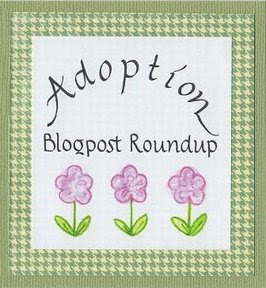Today on the adoptive parent channel of “Café Mom,” a story was posted about an adoption gone terribly, horribly wrong: A Dutch couple living in Hong Kong, who had adopted a South Korean infant, decided to “return” the little girl (now seven years old) to the orphanage where they had found her. Claiming that the little girl had not adapted well to their culture, they decided to “return” the little girl soon after her mother became pregnant (they had been told she could not conceive).
Reading the story, I was reminded that people with limited adoption experience tend to paint both the adoption process and adoptive parenting in black-and-white terms: overly sentimental on one hand, overly critical on the other. In reality, both the people and the process tend to be far more complex. In the example above, the press vilified the Dutch couple, painting them as cold and heartless individuals who cast away their own daughter like so much trash simply because they had a “real” child on the way.
Doubtless the reality was far more complex. Consider what it would be like to be a mother in a strange land without the support of family and friends, married to a man with a demanding job that took him away from home for prolonged periods. You decide to open your heart and home to a little girl in need of a family – and discover the reality of adoptive parenting is a lot harder than you thought. The little girl has needs and challenges that were not initially apparent when the child was placed with you. Still, you persevere, hoping that the difficulties will smooth themselves out.
Instead, the pressures build. The child does not get better. Then you and your husband are ecstatic to find out that – miracle of miracles – you are pregnant. After the initial exhilaration, reality begins to set in. You have barely been able to manage the needs of the one child, and now you will be juggling the needs of two!
Looking for reassurance and support, you call home … and get a series of well-meaning but demoralizing half-truths. “You’ve done everything you could. Now you have a child of your own – your own flesh-and-blood. You’ve got to think of her. Soon you’ll be coming home; if you bring that Asian child with you, she’ll never fit in. She’ll always know – everyone will know – that she isn’t really yours. Is that fair to her? No, better to find a family for her among her own people. It’s really for the best…”
And so, back to the orphanage from which you got her. The dark-haired little girl doesn’t even cry. She just looks at you reproachfully, clutches her doll a little tighter, and follows the social worker back inside the cold gray building you all thought she had left for good.
Now, it is possible that I’ve added or omitted details that belong in this story – I don’t know these people, nor do I have details about the case itself. What I do know is that there is more to the story than meets the eye. Because when it comes to adoption, there is always more going on than can be perceived by the casual observer.
How Could She Do It?
It’s hard to imagine how that mother felt – barely able to breathe, torn between horror and relief, anxiety and a guilty sense of liberation. The nightmare was over, the fairy tale about to begin. And yet, she felt more like the selfish stepmother than the princess. And in her heart of hearts she knows that the joy of motherhood will always be tainted by the memory of the child she failed, the child she left behind.
How can I pretend to get inside this woman’s head, when I’ve never met her? In reality, I can only draw upon the memory of how it felt for me when Craig and I asked the agency to find another home for our oldest foster child, after she had been with us for more than a year. We had our reasons – most of which would not be appropriate for me to discuss here (for her sake, not mine).
I will always be grateful for the couple who stepped forward to love and care for this little girl, who will always be a part of our lives. She is my children’s sister, and she has grown up to be a beautiful young woman – just as her older brother, adopted by another couple, has grown up to be a fine young man.
But how much heartache could have been avoided – how much needless pain was inflicted on everyone concerned – because we overestimated our own abilities and resources as new parents, and underestimated the challenges ahead. It was an easy mistake to make under pressure. I looked into those three little faces, and my heart shouted, “Yes, I can! They need me … and I just know God wants us to do this.”
Again, I know whereof I speak. Because of that, I encourage prospective adoptive parents to assess – as accurately and dispassionately as possible – their own situations to avoid making an impulsive decision they may one day regret.
“Should We Take This Child?”
Questions to Consider …
Among the questions you need to consider before accepting a foster care or adoptive placement:
Have you spent enough time around and alone with children to have an accurate picture of the ongoing demands of parenting? Reading is an important part of parenting, but there is no substitute for hands-on experience. If you’re unsure you’re up to the challenge, consider “borrowing” the child of a friend or relative for a weekend or even longer.
Have you decided what age and/or gender of the child you feel best able to help? For example, some adoption experts strongly advise against disrupting the natural birth order – fostering or adopting a child who is older than children already in the family.
Do you know how you respond – physically as well as emotionally – to prolonged periods of sleep disruption and other environmental stressors? (New parents wanting to adopt or foster more than one child may want to consider carefully “spacing” placements to allow time for bonding and adjustment.)
What commitments do you have at present (e.g. existing immediate and extended family needs, work or educational goals, etc.)? How will a child affect these commitments? If the mother is currently working outside the home, can the family get along without her salary? (If at all possible, adoptive mothers stand the best chance of forming a strong bond of trust with their new child if she is the sole caregiver, especially early in the placement.)
If the child is part of a sibling group, is additional support available to ensure that each child gets enough individual “bonding time” with her new family? Does one or more sibling have extraordinary emotional or physical needs that make it difficult to meet the needs of the others? (If so, is it possible to separate the siblings, even temporarily, if it would mean the difference between a successful and disrupted placement?)
What do you know about the child’s medical case history, including information about his birth family? Does the child have siblings or extended family with which the child should maintain contact? Especially with domestic adoptions, have the rights of both birthparents been relinquished or terminated? If the child has been in more than one foster home, do those foster parents have observations or concerns about the child and his or her ability to bond with another family?
Does the child have a history of abuse or neglect, or suspected history of abuse or neglect, that may require extraordinary time and attention or jeopardize the health or wellbeing of other members of the family? If so, have you received sufficient training so that you will be able to help this child? Approach those with unknown or sketchy histories with an extra measure of caution, spending extra time and securing independent assessments as necessary in order to get the most accurate picture possible. Those with special needs deserve a loving family – an informed, loving family that is prepared to help that child become all God wants him to be.)
Are your families and friends generally supportive of your decision to adopt – that is, are they willing to lend practical assistance as needed? If not, be cautious about making a permanent commitment to a child with extensive physical or emotional needs.
Have you spent significant time talking and praying through your decision, both alone and with those who will be part of your support system after the children become part of your family? Take the time you need to be sure you are basing your decision on the Holy Spirit’s leading – and not just your own idealistic wishes and dreams.
Adoption and foster care can be a beautiful, joy-filled experience. Yes, it is possible to love a child – fiercely and without reserve – who comes to you through adoption. However, the bonding process may happen on a somewhat different timetable. Be patient. Gather as many facts as you can before making your decision. Tune out those who are unnecessarily negative on one hand – or overly idealistic or “pushy” on the other. (This especially holds true to caseworkers, whose first priority is often finding homes for as many children as possible, as quickly as possible.)
Above all, remember the words of Blessed Mother Teresa of Calcutta: “God does not call the equipped; He equips the called.” If God is indeed leading you to bring another child into your home, you can count on Him to give you everything you need – and peace above all – to bring your family together as He intends.












 My StumbleUpon Page
My StumbleUpon Page



 border="0">
border="0">
















5 comments:
Excellent post and good advice.
A wonderful post full of thoughtfulness and deliberation.
Thanks for participating in the Christmas Edition of the Carnival of Family Life! The Carnival will go live at midnight (Pacific time) on December 24, 2007, at Colloquium!
Happy holidays!
Very thorough questions and compassionately presented. I'm definitely linking this for future reference.
Thanks for such a thoughtful post. And thanks for submitting to Mom's Blogging Carnival. You can see your post here: http://www.gogirlfriend.com/reviews/moms-blogging-carnival-4560
Enjoy!
Thanks for such a thoughtful post. And thanks for submitting to Mom's Blogging Carnival. You can see your post here: http://www.gogirlfriend.com/reviews/moms-blogging-carnival-4560
Enjoy!
Post a Comment